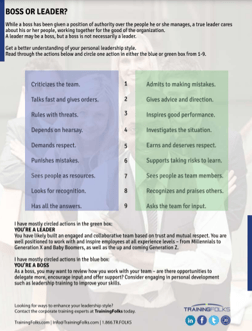Skills to Include in Your Leadership Development Training
Employees will look to their leadership team for advice, support, and guidance for anything that happens in the organization. Your leaders are the voice of your company, so it’s important to ensure that they are on the same page, know the organization's vision and have a clear understanding of its direction.

So, what should you include in your leadership development training plan to create a strong leadership team? We have listed a few of the most important elements of any leadership development training program.
Coaching
Teaching coaching skills to leaders is critical for business success. Coaching allows leaders to help employees develop the confidence to help themselves by providing guidance and a mirror to the employee’s everyday challenges.
Coaching can also help the employee challenge themselves to higher performance, deeper relationships, and better communications in their daily working practices. These a activities promote employee well-being and improve the health of the organization. Teaching coaching to your leaders will also help them develop the following skills:
- Giving and receiving feedback that is suited to the situation and encourages, corrects, or challenges the employee to think critically and problem solve
- Situationally appropriate direction giving, which will help leaders empower their people and not feel the burden of having to be directive or corrective all the time
- Active Listening, which will prepare the leader to listen not just to the words being said, but also to the manner in which they are said, and what is left unsaid, which can often communicate more than the words spoken out loud
- Performance Management skills, which will allow the leader to create measurable outcomes with expectations for performance. This will have the effect of providing direction and will help both employee and leader feel like progress is being made.
Change management is a great leadership skill that should be included in any leadership development training program. Organizations are continually faced with changes in market conditions, consumer expectations, and technology and thus, good leaders need to adapt to these changes to keep their organizations up to date. Some of the benefits of including change management skills includes:
- Understanding the roots of an individual’s willingness to change
Good leaders strive for a balance of intrinsic and extrinsic motivation. Good change management training will teach a leader how to strike that balance for themselves and convey that to their employees. - Better, and clearer communication
Change management is all about communicating the right information at the right time.
It is about having a strong reason for change, and solid behavioral activities that reinforce the need. Clear communication helps reduce tension, risk, and assumptions that plague large changes and are often cited as reasons for change failures. - Healthier Conflict and Resolution
Conflicts naturally occur in a change initiative. Teaching leaders how to approach change and seek resolution will result in clearer communication and increased trust within the organization.
Giving your leaders the opportunity to become more aware of their own approaches, as well as others, will help your leaders become more mindful and self-aware of their actions impact on themselves, others, and the organization. Some examples of personal leadership awareness include:
- Emotional Intelligence helps your leaders to understand empathy, personal bias (which is largely unconscious), and give them tools to work with a variety of people on broader terms of communication
- Personal Values, Brand, and Ethics are elements of leadership that a leader demonstrates both consciously and unconsciously. By being mindfully aware of how a leader “shows up” will give them an opportunity to determine the value they are bringing to the organization.
- Communication and Conflict Awareness are two broad ranging skillsets that are deeply important to being a good leader. With good communication skills, leaders can effectively give guidance and direction to their teams without making their teams feel as if they are being dictated to, bullied, or coerced.
- Negotiation skills are tools that leaders use every day. Whether with their own people and peers, their customers, or their competitors and vendors, leaders use their skills in negotiation regularly. Giving them the right tools to avoid thinking traps while encouraging fairness and ethical behavior will help both the leader and your organization.
Of course, there are many other leadership skills that can be taught and should be included where there is a need and time to explore them. These three are crucial and will bring quick wins and easy changes to the makeup of your leadership team.
While a leader may be a boss, a boss is not necessarily a leader.
Get out FREE Download: 'Are you a Boss or Leader?'


